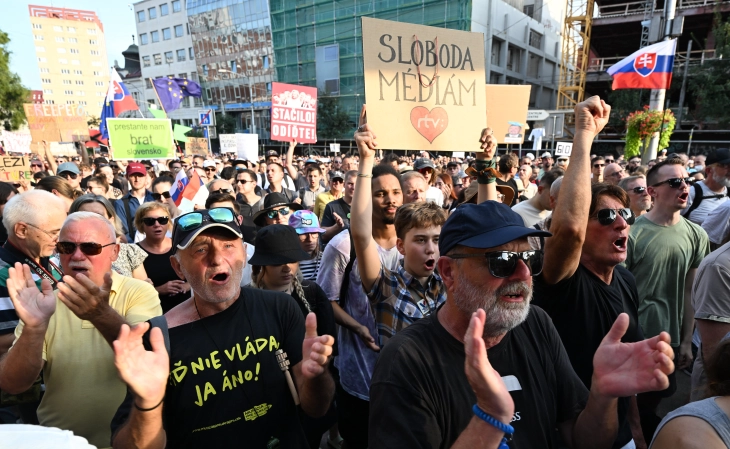Thousands protest cultural policy and justice reform in Slovakia
- For the second day in a row, thousands of people took to the streets of the Slovakian capital Bratislava on Tuesday to protest against the government of left-wing populist Prime Minister Robert Fico and his nationalist culture minister, Martina Simkovicova.
- Post By Magdalena Reed
- 09:05, 14 August, 2024

Bratislava, 14 August 2024 (dpa/MIA) – For the second day in a row, thousands of people took to the streets of the Slovakian capital Bratislava on Tuesday to protest against the government of left-wing populist Prime Minister Robert Fico and his nationalist culture minister, Martina Simkovicova.
While artists and their supporters had called for a protest rally on Monday evening, primarily against cultural policy, this time it was two liberal opposition parties that organised a mass protest directed against the government.
Organizers put the number of participants at 18,000 people. Directed at Fico's government, the crowd chanted "Shame! Shame!"
The main target of the criticism was that after sacking the heads of several key cultural institutions, Simkovicova also dismissed the heads of the country's two largest cultural institutions last week with no notice.
She fired the general director of the Slovakian National Theatre, which also includes Slovakia's most prestigious opera house, and the director of the National Gallery.
In speeches and on banners, the speakers and demonstrators demanded that Simkovicova step down. Some banners also called for the government to go.
Simkovicova, who was nominated for the ministerial post by the Slovak National Party, the smallest of the three governing parties, has courted controversy since she took office in October last year.
She made it clear that she wanted to enforce national Slovakian culture. Simkovicova also announced that there would be no more state funding for what she termed "gender mania" and the "LGBT agenda."
Another target of criticism was a controversial judicial reform, which reduced the penalties for economic offences ranging from petty shoplifting or marijuana sales to grand corruption, which had previously been extremely high compared to violent crimes.
The reform provides for more alternative punishments such as monitored house arrest and higher fines instead of lengthy prison terms.







